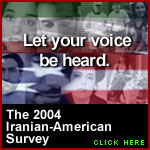 Are we a minority group? Are we a minority group?
Americans of Iranian descent may or may not wish
to be legally classified as a minority
Abtin Assadi
July 20, 2004
iranian.com
United States and International laws protect
the rights of minorities. To that end, minorities are mostly
defined in legal terms. For example the Civil Rights Act of 1968,
as part of the Fair Housing Laws, defines minorities as follows:
"Any group, or any member of a group, that can be identified
either: by race, color, religion, sex, disability, or national
origin;
or by any other characteristic (such as familial status) on the
basis of which discrimination is prohibited by a federal, state,
or local fair housing law".
The United Nations Charter is to promote and encourage respect
for human rights and for fundamental freedoms for all, without
distinction as to race, sex, language or religion. Article 27
of the International Covenant on Civil and Political Rights specifically
asserts the promotion and protection of minorities' rights.
The United States constitution's First Amendment protects
free speech and religious rights, the fifteenth Amendment protects
the right to vote regardless of race or color and the nineteenth
Amendment
protects
the right to vote regardless of gender.
 The constant promotion and realization of the rights of persons
belonging to minorities, as an integral part of the development
of society as a whole and within a democratic framework based
on the rule of law, would contribute to the strengthening of friendship
and cooperation among peoples and States. The constant promotion and realization of the rights of persons
belonging to minorities, as an integral part of the development
of society as a whole and within a democratic framework based
on the rule of law, would contribute to the strengthening of friendship
and cooperation among peoples and States.
Americans of Iranian descent may or may not wish to be legally
classified as a minority, but historically the majority has marginalized
minority groups; hence the legal protection afforded to them
by U.S. and International laws.
The Iranian-American community is by no means homogeneous; all
colors and skin tones as well as several distinct languages and
a variety of religions are represented in the community. Some
members have assimilated faster and gained economic, social and
cultural
success, while others face marginalization due to age, class,
disability, gender or other factors.
Although Iranian-American
community members
differ in their success levels in economic, social and cultural
aspects, the community as a whole suffers uniformly from the
lack of civic participation and lack of access to political power.
The
reasons behind this shortcoming are steeped in our community's
historical background and the lack of democratic institutions
in the home country.  The quest to facilitate Iranian-American civic
participation appears to be the immediate challenge facing the
community as a whole and
education appears to be the first order of business. We all need
to learn how to best engage and influence our local, state and
federal elected officials. Furthermore, we need to recruit other
talents inside and outside the community to mobilize a large
sustained campaign to overcome the lack of political clout. The quest to facilitate Iranian-American civic
participation appears to be the immediate challenge facing the
community as a whole and
education appears to be the first order of business. We all need
to learn how to best engage and influence our local, state and
federal elected officials. Furthermore, we need to recruit other
talents inside and outside the community to mobilize a large
sustained campaign to overcome the lack of political clout.
About
Abtin Assadi is member of board of directors at Bay Area Iranian
American Voter Association baivoter.org.
*
Send this page to a friend
*
|